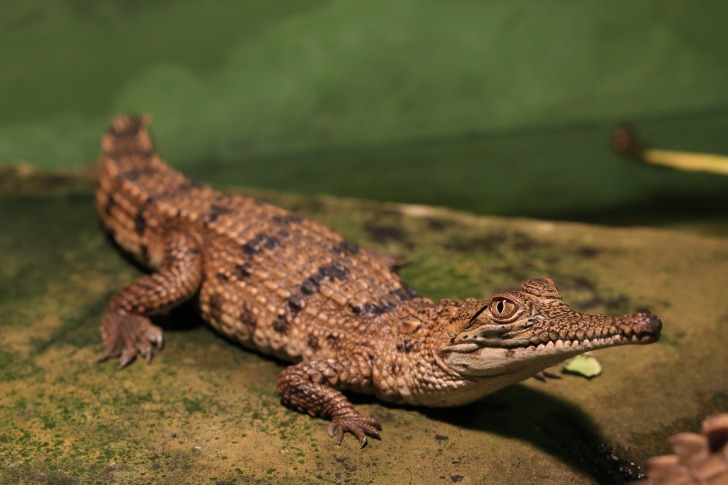Alligators line the edges of Texas waterways in 120 of our 254 counties, including Harris County and the City of Houston.
At least one of the alligators caught in the vicinity in 2021 measured 12 feet long and weighed 1100 pounds.
The other one was 11 feet long.
The smallest, a three-foot-long alligator from nearby Buffalo Bayou, moved itself to the Houston Arboretum and Nature Center pond in 2018.
Everyone gave the alligators the appropriate level of respect in all three situations. Consequently, no one received any serious injuries.
The size of the alligators in Houston and its neighborhoods has locals worried that they could find themselves in a life or death struggle with one of the apex predators.
Although it happened nearly two hours east of Houston, witnesses believe an 11-foot alligator killed Tommie Woodward in the first fatal alligator attack in Texas in 179 years.
Bravado and bullheadedness cost the Texan his life in July 2015 after he said “F the alligators!” and ignored warning signs and pleas from the staff at Burkart’s Marina on Adams Bayou.
Staff told Woodward they had recently spotted an 11-foot-long alligator swimming in the water, pointing out the new warning sign.
Instead, Tommie Woodward and his girlfriend jumped into the bayou for a 2:30 AM swim.
When the alligator struck, the woman escaped the water, but Woodward did not.
Unless you are a Texas game warden or a licensed nuisance alligator hunter, killing an alligator usually results in a class C misdemeanor charge and a $500 fine.
However, Bear, the local man who killed the alligator that killed Woodward, will not face any charges or penalties due to the unprecedented circumstances.

Contents
- So, Are There Alligators in Houston, Texas?
- Is it Safe to Swim in Houston?
- Interesting Houston Alligator Facts
- Safety Tips for Swimming in Alligator-Infested Waters
- Summary
- Houston Safety Overview
- Frequently Asked Questions
- How many Houstonians die every year from alligator attacks?
- Do alligators eat livestock?
- How long do alligators measure at maturity?
- How much money do alligator meat and hides bring annually to the Texas economy?
- When do you face the most danger from Texas alligators?
- How much pressure does an alligator exert when it bites?
- What part of the American alligator's range in Texas?
- Can I kill an alligator in Houston if it threatens my family?
- How much did the 12-foot alligator caught near Houston in 2021 weigh?
- How many Texas counties, including Harris, report populations of alligators?
- What three things cause the most alligator attacks?
- How many alligators call Texas home?
So, Are There Alligators in Houston, Texas?
According to the National Resource Inventory created by the USDA Natural Resources Conservation Service and conducted in 2010, the state has 5.5 million acres of freshwater and tidal wetlands.
Houston lies well within the best alligator habitat in the state, so spotting and avoiding them has become a common local pastime.
Texas is the western range limit for the American alligator (Alligator mississippiensis).
According to Texas wildlife experts, an estimated 400,000 to 500,000 alligators call Texas wetlands their home.
Most of those alligators concentrate along the state’s east coast.
Moreover, Houston lies in some of the most attractive alligator habitats in the entire state.
Is it Safe to Swim in Houston?
Because the alligators near Houston have reached sizes more significant than the 11-foot-long one that struck Woodward, Houstonians have taken outstanding care to heed the advice of Texas wildlife experts.
They stay away from alligator nests, never get closer to any alligator than 30 feet, keep their pets leashed, and supervise their children closely.
Consequently, no one in the area has suffered anything worse than a tail-thwack and some bites.
Harris County, of which Houston is the county seat, has around 2000 deaths from all causes yearly.
Houston accounts for more than 1000 of those deaths annually, and none involved alligator contact.
But just because only one deadly alligator attack has taken place in Texas in the last 179 years does not mean you can let your guard down near these predators.
Alligators strike fast and run at speeds of 35 miles or more per hour.
Once in an alligator’s jaws, the death roll begins on land or underwater.
But other causes, such as heart attacks, opioid overdoses, gun violence, bee stings, drowning, sunstroke, and dog attacks, lead to far more fatalities.
Interesting Houston Alligator Facts
Texas alligators came off the endangered species list in 1978, nine years before they made it off the list in Florida.
Now, alligators fill as vital a role in the Texas economy as they do in Texas ecology.
By 2014, alligator farming in the four states that allow it has provided more than $85 million worth of meat and hides.
Which Alligator Species Live in Houston, Texas?
The American alligator (Alligator mississippiensis) calls Houston and other Southeast Texas cities home.
This long, heavy-bodied reptile measures six to 14 feet long at maturity but will continue to grow until the day it dies.
It will produce and lose as many as three thousand teeth during its lifetime.
The American alligator’s U-shaped snout and 2125 psi bite make it the most fearsome animal in the Texas ecosystem.
Thanks to defending its nests against predation by fellow alligators, raccoons, snakes, and opossums, Texas’s migratory birds, turtles, and shorebirds thrive wherever you find healthy alligators.
Alligators vs. Crocodiles vs. Caimans
The Texas climate does not support crocodile life since they require much warmer year-round temperatures, such as those found in Florida, to breed successfully and survive the winter afterward.
Likewise, caimans, whose v-shaped snouts resemble a crocodile’s, do not live in Texas except as escaped or intentionally released pets.

Safety Tips for Swimming in Alligator-Infested Waters
- ALWAYS obey posted warning signs and listen to locals when they tell you alligators occupy that area.
- DO NOT ENTER alligator-infested waters, especially at night. What you don’t see will maim or kill you.
- DO NOT MIX ALCOHOL AND ALLIGATORS. Alcohol impairs your judgment and sends your situational awareness out the window.
- KEEP PETS LEASHED at all times near anywhere that alligators might be, which includes ANY AND ALL bodies of water deeper than your ankles.
- Keep children away from places where alligators might bask or congregate.
- NEVER approach alligators to take photos, and NEVER turn your back on one, even if someone else takes the picture.
- NEVER FEED ALLIGATORS! Once they learn that people bring food, they can and will kill to get it.
- RUN FAST AND FAR to get away from alligators. Fight as if your life depends on it because it does.
- NEVER, EVER FEED ALLIGATORS. This tip appears twice to drive home the point that a fed alligator will attack in search of food once it learns that people will provide it. A Fed alligator equals a dead one because once an alligator loses its natural caution, it will approach even more people looking for handouts.
- When in doubt, STAY OUT! Better to lose a chance to swim than to lose a life or a limb. Even home swimming pools and golf course ponds require caution when alligators live nearby.
- If you can hear a female alligator huffing, you have ventured too close to her nest. Run away fast, in a straight line, and never return until long after the end of the second year.
- Punch alligators on the snout as hard as possible, preferably between the eyes, if one manages to clamp down on you. Use every dirty trick you ever learned when fighting an alligator. Your survival depends on your ferocity.
- Convince the alligator that you are not worth the trouble and energy it takes to keep fighting, and you might survive the encounter.
- Scream as loud as you possibly can while fighting an alligator.
Summary
Houston, Texas, lies within some of the best alligator habitats in Texas.
The warmer weather and abundant fresh water sources provide thousands of acres of prime alligator habitat.
Nevertheless, habitat loss pushes more alligators into smaller spaces yearly, making encounters with the state’s 400,000 to 500,000 alligators nearly impossible to avoid.
Surprisingly to some, despite alligators eating shore birds, fish, amphibians, and small mammals, alligators benefit the bird and turtle populations significantly.
This benefit occurs because alligators sharply reduce predators such as raccoons, opossums, and lizards that love to eat eggs and destroy nestlings for sport.
In addition, contrary to lurid reports from early American history, alligators do not stalk humans and prefer to avoid them whenever possible.
We must protect alligator nest sites for humans and alligators to coexist in peace.
The sudden attacks on rowers in Oyster Creek after someone destroyed their nesting sites demonstrate how precarious that balance can become.
Continue regulating the alligator farming industry to keep alligators safe after they reach breeding age.
Avoid bull alligators during the breeding season.
The bellowing of bull alligators makes avoidance an easy task if you listen to it.
Never bother alligator hatchlings.
If you do, expect that all adults in the area will run to protect baby alligators, their own or not.
Alligator farming strengthens alligator populations by increasing the number of healthy adults.
More adults equal more potential pairings that will produce successful offspring.
The fact that more alligators in an area indicate high-quality, fresh water only makes alligator success even more extraordinary.
Houston Safety Overview
READ THE FULL REPORT: Houston Safety Review
Safety Index:
- OVERALL RISK: MEDIUM
- TRANSPORT & TAXIS RISK: MEDIUM
- PICKPOCKETS RISK: MEDIUM
- NATURAL DISASTERS RISK: MEDIUM
- MUGGING RISK: MEDIUM
- TERRORISM RISK: MEDIUM
- SCAMS RISK: LOW
- WOMEN TRAVELERS RISK: MEDIUM
Frequently Asked Questions
How many Houstonians die every year from alligator attacks?
None.
Not one Houstonian has ever died from an alligator attack, and the Texas Parks and Wildlife Division wants to keep it that way.
So does every Houstonian, so leave the alligators alone.
Do alligators eat livestock?
Alligators will eat anything smaller than themselves, so eating a pig, goat, or calf would make sense to them.
Take steps to reduce the possibility of an alligator attack on your pets and livestock by providing water sources that do not require approaching the water’s edge.
Good fences make good neighbors, so build sturdy pens that block alligator intrusions.
Even though alligators can climb, they cannot get through poultry mesh.
However, alligators can and will dig, so put poultry wire down at least a foot or two below ground, so your fencing creates a gator-proof pen.
How long do alligators measure at maturity?
Mature alligators measure six to 14 feet when they reach breeding age.
How much money do alligator meat and hides bring annually to the Texas economy?
In 2014, Texans made more than $85 million selling alligator meat and hides.
When do you face the most danger from Texas alligators?
Texas alligators show their most aggressive behavior during their mating and hatching season, which begins in March and ends around May 30.
How much pressure does an alligator exert when it bites?
Scientists have measured alligator bites at 2125 psi, more than enough to crush bones and amputate limbs.
What part of the American alligator's range in Texas?
The state represents the western edge of the habitat of the American alligator.
Can I kill an alligator in Houston if it threatens my family?
Unfortunately, no. Killing an alligator in Texas earns you a misdemeanor charge and a $500 fine.
In addition, only a Texas game warden or a licensed alligator hunter may legally kill a nuisance alligator.
How much did the 12-foot alligator caught near Houston in 2021 weigh?
The alligator weighed 1100 pounds.
How many Texas counties, including Harris, report populations of alligators?
One hundred twenty counties out of 254 have alligators living within their borders.
What three things cause the most alligator attacks?
Mating season (males), nest defense (females), and habitat destruction.
The ordinarily peaceful alligators of Oyster Creek in Sugar Land, Texas, kept a peaceful coexistence with boaters from the Greater Houston Rowing Club until someone decided to clear out their nesting sites.
How many alligators call Texas home?
400,000 to 500,000 alligators live throughout Texas.











